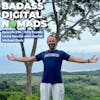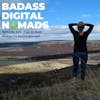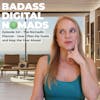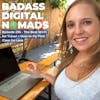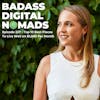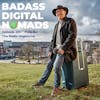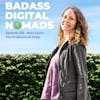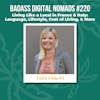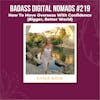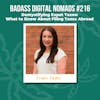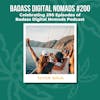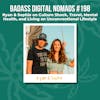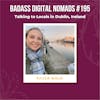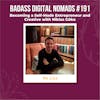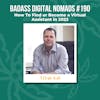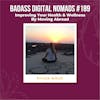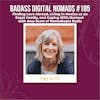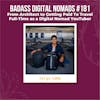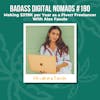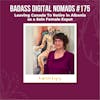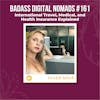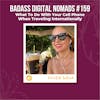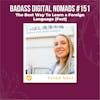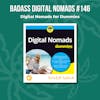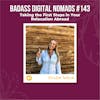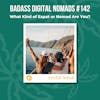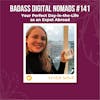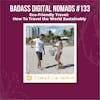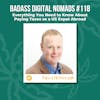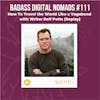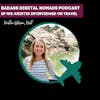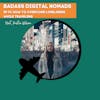How to Live Your Best Life at Any Age with Entrepreneurial Ski Bum, Steve Rout
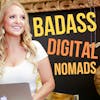
Steve Rout is a British journalist, ski bum, tour guide, online marketer, and world traveler. Steve’s long-term travel adventure began in 1982 when he put his successful journalism career on hold to travel the world. After years of traveling to different continents to ski, rock climb, and paraglide, he found himself back in a corporate office, which led to burnout and a mid-life crisis.
Steve Rout is a British journalist, ski bum, tour guide, online marketer, and world traveler. Steve’s long-term travel adventure began in 1982 when he put his successful journalism career on hold to travel the world. After years of traveling to different continents to ski, rock climb, and paraglide, he found himself back in a corporate office, which led to burnout and a mid-life crisis.
So, he quit his job, taught himself web design, and has been working for himself from home for the past 19 years, making money online with SEO, marketing, and working as a tour guide in the mountains of Austria.
Now 62 years old, Steve continues living life to the fullest and learning new skills every year.
In this episode, we talk about how to “do you” and reinvent yourself at ANY age!
If you've ever felt self-conscious or uncertain about pursuing your dreams or leading an unconventional life, this episode is for you!
TOPICS DISCUSSED:
LIFE DURING THE PANDEMIC:
- How Austria has dealt with covid-19
- How the adaptation to pandemic life relates to war times
- Going through global trauma together
- Tourism in the Austrian mountains
FROM A CORPORATE CAREER TO WORKING ONLINE:
- How does Steve monetize his websites?
- Why he experienced burnout and left his corporate job
- Why being your own boss is not for everyone
REINVENTING YOURSELF:
- The reality of the infinite options you have
- Changing what you’re not happy with and having no regrets
- Looking for opportunities to work and experience new things
- Fear of networking
- The magic of following curiosity and synchronicity
LIGHTNING ROUND:
- Money-saving travel tips
- Practical business tools and editing software
- Tips for learning new languages
- Best spots to visit in Austria
RESOURCES
- Thomas Alex Norman’s YouTube Channel: www.youtube.com/channel/UCeu0J9A1p87aVUqZkMYF-_g
-
Skyscanner: www.skyscanner.com
-
AppSumo: www.appsumo.com
-
Relay That: https://www.relaythat.com/
-
Keywords Everywhere: https://keywordseverywhere.com/
-
Answer the Public: https://answerthepublic.com/
-
Vegas Pro Editing Software: https://amzn.to/3jCSPvc
- Films Mentioned: Before Trilogy
- Before Sunrise
- Before Sunset
- Before Midnight
Recommended Video Equipment:
- Sony RX100: https://amzn.to/3nkkOlI
- Sony RX100 V: https://amzn.to/2Swa4T7
- Sony Z-V1 Vlogging Camera: https://amzn.to/2Swa4T7
Travel Destinations in Austria:
- Salzburg
- Linz
- Graz
- Vienna
- National Parks
- Shonbrun Palace
- Sausage stands
- Austrain Alps Things to Do & See:
- Austrian Tourism Board Website
Get Travel Insurance with COVID-19 Coverage:
........................................................................................................
WORK WITH KRISTIN
- Book a private consultation
- Join the Make Money Mentorship 6-week program (Special offer for podcast listeners $100 off)
- Relocate abroad with Orbis Relocation or Poker Refugees
Support the Badass Digital Nomads Podcast:
- Become a Patron
- Leave a 5* Review: https://lovethepodcast.com/digitalnomad
- Leave a voice message
- Submit a question or recommend a guest (feedback survey)
- Buy new Badass Digital Nomads Merch (Teespring.com/Stores/TravelingwithKristin)
Connect With Kristin on Socials:
-
- Follow on Instagram
- Subscribe to Traveling with Kristin on YouTube
- Subscribe to Digital Nomad TV on YouTube
- Join the Badass Digital Nomads Facebook Group
Podcast descriptions may contain affiliate links of products and services we use and recommend at no additional cost to you.
Introduction: Welcome to Badass Digital Nomads, where we're pushing the boundaries of remote work and travel, all while staying grounded with a little bit of old school philosophy, self-development, and business advice from our guests.
Kristin: 00:00:22 We shall not cease from exploration, and at the end of all, our exploring will be to arrive where we started and to know the place for the first time. That is a quote from Little Gidding by the poet T. S. Eliot, which was apparently in the original Hitchhiker's Guide to Europe and became the travel inspiration for today's guest. Hi everyone. I'm Kristin from Traveling with Kristin, and I'm so excited for you to listen to today's interview with Steve Rout, a British journalist, ski bum, online marketer, and world traveler. Steve and I met in a private Facebook group for aspiring video creators last year called The Travel Video Academy, which is led by a popular YouTuber named Thomas Alex Norman. So for all of you listening in from my YouTube channel, that is how I learned to make travel videos. After seeing a couple of Steve's videos in the group and hearing some of his story, I was so impressed that I messaged and friended him almost immediately because I knew I had to have him on the podcast someday to share some of his travel stories, entrepreneurial advice, and just overall advice for living life on your own terms, because at 62 years old, he is crushing it, my friends.
Kristin: 00:01:51 Steve's long-term travel story starts back in 1982 when he put his successful career in journalism on hold to take a year off to travel the world. And you guessed it, he never came back. For many years, he was a, a ski bum and later rock climbing and paragliding bum who moved to different places each winter and summer season, all around Europe, North America, and Australia. However, he eventually found himself back in a corporate office years later, where he then proceeded to burn out and suffer a midlife crisis. So he quit his job again, taught himself web design, and for the past 19 years, he's been working for himself from home, making a living through SEO, Online Marketing and his Passion project and Side Hustle as a tour guide in the mountains of Austria. In this interview, we talk about how to basically do you and reinvent yourself at any age.
Kristin: 00:03:02 So if you've ever felt self-conscious or uncertain about pursuing your dreams or leading an unconventional life, then this episode is for you being the journalist that he is. Steve has lots of stories and nuggets of wisdom to share, and at the end of the interview, we do a lightning round where we disclose some of our top travel tips and secret spots to visit in Austria. Before we get into it, though, thank you to Lizzie in Hawaii who left a review this week on Apple Podcasts. She says, keeps getting better, really enjoying this podcast. Started listening over the past few months, and Kristin has great energy and super relevant topics, some awesome guests in the mix too. Looking forward to more. Thanks again, Lizzie. And to everyone out there listening and remember to watch the video version of this and other interviews and access lots more premium and behind the scenes content that I don't share anywhere else.
Kristin: 00:04:09 Consider becoming a patron of both my YouTube channel and podcast for only $5 per month total. You can sign up at patreon.com/TravelingwithKristin. That's P-A-T-R-E-O-N.com/TravelingwithKristin, K-R-I-S-T-I-N, and enjoy today's episode.
Podcast Interview:
Kristin: It is the pandemic. We are in September of 2020 for anyone who might be listening from the future. Well, I guess everyone's from the future <laugh> at this point, and we're in month six of the Coronavirus Pandemic. So give us a little context as to, uh, where you're living right now, what your daily life is like, um, over, I know you're in Europe, in in Austria, but I'll let you tell tell the story of where you are now.
Steve: 00:05:05 Okay. We are living in a small village in, uh, Austria, right on the German border. So it's, uh, I I went for a walk this morning into Germany. Uh, there's no border controls anymore. Uh, there were at the start of the pandemic, they were stopping people actually coming out of, you know, we couldn't go outside our small village area. We weren't allowed to do that. And, but now, uh, we have a lot of people coming over from Germany for tourism. Here we are right on the edge of a, um, not a national park. It's actually like an international nature reserve, which stretches about 50 miles, um, into the mountains behind. And, uh, yeah, the, the coronavirus is still still affecting us now. Um, we are about half an hour away from the main town nearby town, which is, uh, Innsbruck, and it's all rising there as it is in other places. It's, uh, as well, but we're a small village of about 1200 people. So, uh, there's not that, uh, not that many people, and they're pretty good about, uh, about looking after themselves.
Kristin: 00:06:21 So everyone's kind of going about their daily life right now. Is there any fear or any panic happening?
Steve: 00:06:27 There's no panic happening. I think pe- I think as is the same in a lot of other countries at the moment. People are using the summer to try and get a bit more of a normal life. So they're being a bit more sloppy about all the rules and regulations that, uh, that you have, especially people that have gone on holiday to places like Croatia, which is bringing a lot back to Austria at the moment. Uh, they've just introduced a new, what they call an ample system, which is like a traffic light system with four traffic lights. So they've got green, orange, no, green, yellow, orange, and red, which are different levels of, um, uh, restrictions that you can do. Green is there, basically there is no virus. Um, you can pretty much go about your normal life as long as you keep the distance to, to a person and follow specific rules or, uh, yellow, which is, they're just going to tomorrow, I think they're going to make Innsbruck, yellow because the, the amount of people infected there has gone up. Um, and a few other places in Austria are yellow as well, uh, and they're not, that's a few more restrictions. And then orange, uh, that's going back to the restrictions we had before. And then red would be kind of total lockdown, which we also had here.
Kristin: 00:07:59 Wow, that's fascinating. So you can tell what the statuses of a town. Yeah, by their traffic light outside.
Steve: 00:08:07 We actually, they've, they, they're very good. Uh, the Austrian are very good when it comes to technical stuff, and, uh, they're early adopters of, uh, uh, of a lot of, uh, uh, modern, you know, kind of more modern things to do with the internet. And, uh, they're local charity, in website, you can go to a particular, uh, go to a particular page and it'll tell you live, you know, how many people there are infected in a small village, like in our village, for example. We know that there's one person that's been infected in the last, uh, uh, in, you know, in the last couple of days or or so. The next village over has got one as well. Um, so you can, you know, you can keep an eye on it, live in real time if, uh, if you need to.
Kristin: 00:08:59 It, it's, it, it's so surreal. It kind of reminds me of what I imagine it would've been like a bit during war times, because I've spent a lot of time in Europe, a lot of time in history museums and reading about World War I, world War II, going to all sorts of historical sites. And although we don't have, obviously war is much worse than a pandemic, the worst is a pandemic mixed with war. But just the way that governments have organized and putting controls and the way that people have adapted to it quite quickly as if, as if it's just normal life, because there's no other option but to adapt. It just brings these memories back of seeing what things were like back in World War I and World War II, where situations were very dire and difficult, but people just switched into this survival mode where they adapted, where they accepted what was going on. And it's just a little bit surreal right now. Um, do you, do you agree? I mean, you've been traveling for a really long time, and none of us were alive back during those times, but you've lived in Europe a really long time.
Steve: 00:10:15 Yeah, and it's also interesting to live in the mountains like we do. I mean, we, we are in a small village, literally 10 minutes outside my doorstep. I can be in, in mountains, you know, in and, uh, away from, away from everyone if I want to, uh, to be. And I remember, I, I also used to be a, a walking guide. I used to take walking groups in the, uh, uh, in the mountains. And I remember going up to one of the mountain huts in Austria, and the person who was there, uh, her father was there and his mother, so her grandmother, uh, they were talking about her one time when I was up there and they were saying, you know, she lived up on the, uh, on this mountain hut. And from this mountain hut, you could actually look all the way down to the valley, which goes up to the Brenner Pass, you know, the Brenner Pass, the border, the border with Italy.
Steve: 00:11:08 When you go from Innsbruck over to Verona, you go up towards the Brenner Pass and there's a big motorway there, and you can actually look all the way down the valley where this hut is and, uh, see the traffic going backwards and forwards. And she said, you know, her grandmother in the wars, all this war, you know, the, the troops were going backwards and forwards. There was fighting down in the valley, and she just lived up and up in the mountain hunt and these kind of waves washing around below her, you know, of all this, uh, tragedy and fighting and, and, and whatever. And she was just up in the mountains. So to a certain extent, you see that here, you know, you can kind of stay up here and you don't, right. You don't feel as effective. When we, we went down to visit some friends who were over from Vienna, uh, down in Innsbruck, and we went for a meal with them, and it was like, oh, people, you know, people around, people around me, you know, all these, uh, all, all these people.
Steve: 00:12:06 We weren't used to it at all, you know, uh, having the traffic, having the, uh, uh, 'cause when it all started, you were saying as well about it being wartime. I remember we are lucky, we have a balcony, uh, where, where we live, and we were sit, um, and luckily the weather was good when the Turo was locked down completely. Um, so as I said, you couldn't go outside your village unless it was to a doctor, or unless you didn't have a supermarket in your village, you could go to the supermarket, but that was it. You weren't allowed to go outside, apart from, to walk a dog or something like that. And, uh, I remember sitting on the balcony and, and just nobody passing. You know, we are normally quite busy where we, where we live, there are people going past on mountain bikes going into the mountains and walking groups and, and, and what have you. And there was just nobody, it was like being in a zombie movie, um, where, you know, you see these people walking through London and there's nothing, nothing going on. It was, it's at the same here. There was just nothing. You didn't see, your neighbors didn't see anyone. They were, they were all just stuck inside. Whereas I think it was a bit different in the US from, from what I've seen or what I've read about, uh, the way people are reacting to it over there.
Kristin: 00:13:22 So yeah, it's actually surreal because when the pandemic first started, I was in Miami and I had planned to be there for a couple months, and then I ended up staying because of the pandemic, but everything went completely silent. And it's really weird to think back because of how quickly everyone has adjusted. It's like, we've gone through this global trauma together at the same time, and now we all have some kind of PTSD, because even when I watch old TV shows or movies or any video, anything that was filmed before the pandemic, it almost gives me an anxiety to see all of the people who are so close together and talking close together. I'm like, what are they doing? Or what are they thinking? They're too close. But in Miami, it was the epicenter of the pandemic for a while, but I couldn't really tell a difference. I mean, it was really quiet, like a ghost town, you know, apocalyptic for a while, and now there's traffic again and everything. But it seems like life has just kept on kicking along and.
Steve: 00:14:30 Yeah, I mean, we see the, we see the pictures of all the people on the beaches in, you know, for spring break or, or, you know, whatever's going on. Uh, you know, over on the Cocoa Beach or, or wherever people, you know, it is that people are, people are gathering. Um, and you, you see it in the UK as well. All the people, you know, rushing, rushing down on a bank holiday to, to go to the beaches and you think, what are they doing? You know, it's, uh, uh, but as I said, we're, we are in the mountains here and we're getting a lot of people, but from the point of view of, of, if you want to be not cynical about it, but hardheaded about it from the point of view of tourism, which is what people live from here, uh, I don't think it's eventually going to be a bad thing.
Steve: 00:15:19 They haven't had a, a, you know, the, the, the places that are open here, the hotels and the, the guest houses and the apartments or whatever, it's really difficult to find a room at the moment because people want to come to the mountains, you know, away from ev- everything to the clean air to, you know, and go off walking by themselves or go off mountain biking by themselves, you know? So I think from that point of view, it's, it's going to be interesting in the winter when, because they're now starting to talk about the winter season. And of course, you, you talked about, uh, looking back and, and feeling really strange, looking at things before the pandemic. I've got some film that I was thinking about editing, and I was having it from the winter season, and I was looking at some of the skiing footage that I've got, and I was thinking, that's weird. You know, that's, you know, the people in lift lines, people on chair lifts, people piling into cable cars, people, you know, doing the appre ski at the bars and what have you. And that's all gonna change how we yet, we don't know yet. But, uh--
Kristin: 00:16:26 And will they be opening the ski resorts? Have they said anything about that yet?
Steve: 00:16:31 Yeah, they will be, because it's- from the point of view of the economy, I mean, it's such a major thing in the Tyrolean uh, for, you know, the not to have the skiing would be, you know, to cut out, uh, a massive proportion of the, uh, uh, of the economy here. But having said that, I think it's gonna be a very, very different market that they're going to be appealing to, uh, because a lot of people were infected, I don't know if you know about this in the states, but, uh, a lot of people in Europe were infected coming back from one of the, uh, from one of the Tyrolean ski resorts. Um, and
Kristin: 00:17:12 I didn't hear about that yet.
Steve: 00:17:13 At, at pre ski bar, Northern Italy was also the Northern Italy ski resorts. Um, it was, the virus was in there, but a lot of people came back from one particular resort in, in, in the Tyrolean and then spread it around, uh, spread it around, you know, their, where, where they were living. And in fact, there's
Kristin: Right
Steve: Probably shouldn't talk about it so too much, because I think there's going to be a massive lawsuit, uh, uh, about that in--
Kristin: 00:17:42 Wow
Steve: 00:17:43 In future, future months coming.
Kristin: 00:17:46 It's a difficult decision right now to travel because
Steve: Yeah
Kristin: do you don't wanna be part of the problem, but then things are open and people are saying that they're abiding by these guidelines and that they're making it safe. So there is no right answer, I guess. It's just a personal preference. And I've been making all these travel videos on my channel, and half the people are traveling, and then another part of them are saying, don't travel. And I am still staying put, but I've been thinking about going snowboarding this winter, but I don't wanna do it if it's, you know, not socially responsible. So I might just skip it. We'll see.
Steve: 00:18:27 Where do you go?
Kristin: 00:18:29 I go a different place every winter. Okay. I actually haven't been to Austria in the winter, so maybe that could be
Steve: Yeah, yeah.
Kristin: On the list next. Well, I would like to, well, we're, we're still banned. U uh, US citizens are still banned from the Schengen area, but I would like to talk a bit more about your lifestyle there and why you chose Austria and, and got a residency there. But I guess we should go back a little bit to the beginning so that people can learn more about you <laugh> and your, so your interesting, interesting life. So, let's see. Okay. First, what is your current job right now? Or how are you making a living online from this small village in Austria? And then we'll go back to how this started.
Steve: 00:19:22 Okay. I have, um, I do a number of different things like I imagine a lot of digital nomads do. Um, but I, as I said, I'm qualified as a, uh, a mountain walking guide, and I do bits and bobs of that normally, obviously at the moment, uh, not so much because I tend to do it for British American, Irish, Chinese guests, English speaking guests, so none of that going on this summer I do some translation work, which is, uh, which was actually very helpful. I work for some of the local tourist offices and, and do translation work for some of the, um, magazines that they produce for tourists coming into the area. Uh, but the main way that I earn a living is from websites that I set up and that I produce content for, um, which is basically writing the articles on the websites and, uh, taking pictures and eventually, hopefully when my skills get good enough to, uh, putting videos on as well.
Kristin: 00:20:34 And how long have you been self-employed for?
Steve: 00:20:37 Uh, self-employed since 2002, I think.
Kristin: 00:20:43 Wow. On the internet or just doing all sorts of different things?
Steve: 00:20:48 Yeah, I kind of got to the midlife crisis age, and I had quite a good job in Innsbruck working for a travel company. And it was the kind of job where, uh, people would say, oh, you know, your job's great, you know, and, and I thought, can I see myself doing this for the next 20 years or 25 years or, or so? And I thought, no, I can't. And if I wanted to move on in the industry, in the travel industry, it probably meant going back to the UK, uh, which I didn't, and to go into management and, uh, what have you, which I didn't want to do. And I, one, it's very interesting actually working in the travel industry because you meet all kinds of people who, who have drifted into it from different backgrounds. And one of the staff I had who were working, yes, I know your, your background as well, <laugh>, uh, but, uh, one of the staff I had working for me had actually done a lot of kind of personnel training, and he got me to do one of his training exercises about what I wanted in life, what I wanted from, you know, my life and, and got me to go through it.
Steve: 00:22:04 And it really made me think about, you know, what I wanted to do with the, uh, you know, the upcoming years. And he said, yeah, it looks like, you know, you want to be your own person. You want to work for yourself, so why not do it? So I did. I kind of quit my job. Um, and I, at that time, I had kind of noticed that there was a, a, a niche, uh, because a lot of the websites that I was looking at through my job for hotels or for, you know, travel providers, they were dreadful, uh, when it came to the English language. So I thought, A, they're not particularly good websites. B their English is not very good. So there must be a, a market there for somebody who could make websites for them, and, uh, and then provide an English, you know, a mother tongue English service for the websites, um, as part of the, uh, as part of the package. So I started doing that, and then as I started doing that, I got interested in using language, uh, in the sense of search engine marketing. So I got involved in that side of things. And then once I got involved in that side of things, I decided, hold on a sec, if I'm getting other people's websites to rank, well, why aren't I doing it for my own websites? So I started doing my own websites, which was, uh, which was how I got into that side of things.
Kristin: 00:23:37 So how many websites do you have now?
Steve: 00:23:40 Active? Probably 25, I would say between 25 and 30, I would think.
Kristin: 00:23:48 Wow. And you're creating the content for all of those.
Steve: 00:23:51 Yeah, but I think there's a big difference now between what I understand as content and what a lot of people who are coming in, 'cause obviously I'm a lot older than a than a lot of people who are in, in this kind of, uh, business. And when you say a website to a lot of people, even a websites old hat now, to, to many people, they, they're thinking about, you know, YouTube channels, Instagram, uh, all, all the social media, Medium, you know, using all that, all that kind of stuff, uh, using Wix, um, and, uh, and other tools along those lines. But most people, when you say to, to people under a certain age, a website, they understand you to mean a blog automatically. They think a blog, a website's a blog, um, or, you know, something that you update all the time. And the sites that I tend to operate are tend to be what you would call evergreen content. So you're not having to update them a tremendous amount. You know, they'll be to do the, you know, where something is isn't gonna change, what the history of something isn't gonna change a vast amount, uh, how to do certain things in a particular area isn't gonna change that much. So there is updating to do, but not necessarily, there isn't a vast amount of work to do for, you know, each individual website every, every week.
Kristin: 00:25:21 Right. I mean, that's what Google is how to do everything is is people searching for answers to their questions. So how do you have these sites monetized? Are you getting ad revenue from the sites or affiliate links, or are people buying affiliate products or
Steve: 00:25:41 Affiliate.
Kristin: Affiliates? Okay.
Steve: Yeah. Yeah. Travel industry affiliate.
Kristin: 00:25:45 Great. Well, let's go back, let's go back to your, your background, um, just to provide people with more context. 'cause I know I know more about you than than the listeners, so I don't wanna give anything away. But how did you end up going into journalism originally? Because you've always, from, from your bio and your background, it seems like you've always had this wanderlust and you've always had this itch to do something different and something unconventional. And that's what's so interesting about it, because these days, with all of the technology and all of the awareness of other people that are doing unconventional things, it's still difficult for people to pull themselves out of the status quo because a conventional life is so ingrained in our global society. But we are able to provide through blogs, through videos, through podcasts, through all of this, these different forms of content, alternative ways of living. But you started back in the seventies and eighties trying to, trying to carve your own path. So how did you, how did you start off with journalism and then, and then how did that lead into a life, a li a lifetime of travel?
Steve: 00:27:15 When I was at school, um, I was involved in, in Britain, they have a lot of schools have what they call school magazines, uh, which are produced. I, they probably have school newspapers in the USA as well, uh, I think. But, uh, so you have a, yeah, like a little committee of students, uh, underneath the English teacher who produce a, uh, a school, you know, traditional school newspaper. And normally what it has is, you know, how the sports teams did each year and, uh, you know, who won the Debating Society priors and who was the, you know, valedictorian or, or, you know, whatever it is that a particular school has. And we took it over. We had, we had a really good English department, and I'd always been interested in, in writing anyway, and there were a group of us group of friends who were on the committee there who produced the, uh, school magazine.
Steve: 00:28:19 And we changed it completely from this, you know, traditional old style school magazine. And it was, it became something called, if Only Mother Could See Me Now. And it was you know, kind of, uh, people's students writing, uh, you know, some quiet, uh, uh, controversial pieces about, you know, the, the way the school day was structured, how it was controlling all the students. I mean, nowadays, you know, you do actually have a lot more, uh, students have a lot more say in what goes on in their schools. And, uh, certainly in Austria they have like student councils and, uh, and things like that. They didn't use to be any kind of that stuff. You did what was, you did what was said when I was at school, so that it was very controversial what we did there. And we, you know, uh, we enjoyed doing that a lot.
Steve: 00:29:12 And then when it came time to leave school, I'd actually, uh, not failed, but not got particularly good grades in one of my final exams. And so the idea was that I would, uh, uh, that I would retake the exam the next year and then go on to university, which is what people tended to do, uh, from, uh, uh, af after that. And I ended up working in a warehouse and really enjoying it, um, during the, uh, during the year that I had while I was still studying. And I think my mother got a bit annoyed, uh, about me enjoying working life too much. And she plunked this application form down in front of me and said, there's a journalism course at the, at, uh, a college nearby. I think you ought to apply for it. And I thought about that and thought, yeah, sure, sounds quite good.
Steve: 00:30:10 It was really difficult to get onto at that time. Uh, I think they had something like, something ridiculous, about a hundred applicants for every, uh, for every place on the, uh, on the course. Uh, and there were only six in the whole country, and it was for an apprenticeship as a professional journalist. And so when you, when you finished that course, you then when and did your, your apprenticeship, uh, on a regional newspaper. And after about nine months, I think it was, or a year, you took what was called a proficiency test. And, uh, then you, you know, you were a proper journalist if you passed that test. You were, you know, part, you were allowed to join the Journalist Union, the NUJ. And, uh, after <laugh>, when I, when I did that, I walked straight into the first ever national strike of the, uh, of the Journalists Union.
Steve: 00:31:07 We were, uh, we all had to go on strike. 'cause the, uh, the, the print unions and the journalists unions were very, very strong in those days. This was without getting too much into politics, this was going back into the days of Margaret Thatcher and, uh, the minor strike and the, uh, the whole idea of the unions being broken up. 'cause they had too much power. And, uh, the newspaper industry was one of the ones that was very badly affected. And we went out on strike, partly in sympathy with the printers who were being, you know, quite badly hit at the time. And eventually that all finished. And, uh, it was a very interesting time to, uh, to write about and to, to experience.
Kristin: 00:31:54 I love that, because you, you liked doing, I guess what we could say, you know, laborers types of jobs. You are totally happy with that. But there was this pressure coming from your mom that to go into knowledge work, and you decided to do that because like many people, we listen to our parents and we oblige to the pressure that they give us to go to college or to get a certain job. And you did that and you did like writing and you did well at journalism, but then why did you quit after that instead of you, you, you told me that as you were, as you were supposed to make this career jump to newspaper, TV, radio, you know, to the next level of your career in that linear career ladder, you decided to go travel instead take us back to that decision and to why, why you made it.
Steve: 00:32:59 Um, yeah, at that stage, you kind of, you were working for regional at the I at that point, I was working for a regional evening newspaper, and so that was like quite a, you know, a lot of people stay at that level the whole time. But if, you know, if you had ambition within, within journalism, you know, that was the kind of stage where you then went up to work on the national news newspapers, uh, or you moved into TV or you moved into radio, which a lot of my, you know, the people that I was on the course with and the people I was working with did make that, uh, that jump. And some of them, uh, you know, were nationally <crosstalk> still there. Journalists, yeah, yeah, that's right. Uh, and some of them have left. Uh, and, but I remember I've, I very vividly remember, um, I'll, I'll be a little bit vague here just in case this podcast <laugh>, uh, ever reaches there, is I, I remember somebody who was superior to me and about 10 years older than me, I was in my early twenties then, I suppose.
Steve: 00:34:03 And, uh, he just got married and I was whittering on about, you know, going, traveling or, you know, wanting to see these different places and, uh, what have you. And he sat me down one time, he just got married and he said, look, Steve, you know, you are, you keep on talking about doing this. And he said, don't get me wrong. He said, I'm happy about being married. Uh, and I wouldn't change anything about it. He said, but I know now that I'm never gonna have the chance to do the things that you are talking about doing. And so go and, you know, go and do them. And I remember thinking to myself, you know how, what a strange feeling it must be, you know, 29 years old or 30 years old to say, I'm never gonna have the chance to do this thing again. And that was what decided me, you know, not to be in that stage. I didn't wanna be 10 years on from that being in the same stage as this particular person was. And so I decided to take a year off because at that level of journalism, you could always come back in at that level and then make the jump again. If you made the jump and then went off traveling, then you probably have to drop down again and then try and make the jump again. So I went off theoretically for a year.
Kristin: 00:35:24 It's like the famous last words. Uh, I'm going for one year and then I'll be back. I mean, I said the same thing. And we used to joke about that in Costa Rica with the expats. They'd say, come for a month, stay for a year, come for a year, stay for a lifetime. And it's because that is the journey. It's not like you quit doing your life and then go back to the career ladder. Because once you get out of it, a lot of times it doesn't make sense to come back into where you were before, unless it's a sabbatical of some kind where you're already entrenched in, experienced in that career, and you, and you go specifically planning to come back. I mean, sometimes it's different, but I find that everybody has a moment like that where they saw something or someone said something to them, or they heard something that made them just kind of make that decision. Whether they dropped what they were doing, quit their job and started traveling right there. Or whether that statement planted a seed for them that they said, you know what? I am going to do this. I am going to go travel. I am going to go follow my dream. And it is sad for the other people that said that to you, because it's just a sad statement to be in your late twenties and to think that it's over like that, you have to then wait until you're retired to.
Steve: 00:36:51 Oh, yeah. I mean,
Kristin: 00:36:52 to go do something.
Steve: 00:36:53 That's very much the case. You know, I, uh, with the, you know, moving on through the decades, uh, you know, with the, with mountain walking, you very much get a kind of age range of, you know, late fifties, sixties, seventies, you know, the people coming through wanting to do that, uh, that kind of holiday. And, um, so many people said, you know, I was always planning, you know, I was always wanting we were going to retire. Um, I was going to come with my husband and we were going to do this, but, uh, you know, he retired and his, and he, he's sick now and he can't, you know, he, he can't travel or somebody died of a heart attack or, you know, all these things. People postponing their life until, until, or not postponing their life because people make decisions. People make decisions to have families, people make decisions to, you know, get on in their, on their job. And there's lot, there's nothing, you know, there's, everyone has to make their own decisions about what they, what they want to do, as long as they're conscious that it is a decision that they're making.
Kristin: 00:38:00 Right? I think that's what's missing. I think that's what's missing in society is just that transparency, that there are choices and there are options, and there's an opportunity cost to each one. So it doesn't mean that you have to check all the boxes on what you do, you know, get the promotion at work, have the dog and three kids, the wedding ring, all of the things, the house, the mortgage, the cart. And then it doesn't have to be that way. It could be putting them out of order, or it could be have a kid while you're traveling, or while you're living in an RV, or, you know, it could be mixed together. And I just wish that there was more messaging in society that you can do things out of order, you can do things simultaneously, and there's infinite other ways to live than waiting until you're 65 to go and do it.
Kristin: 00:38:57 And it doesn't, there's nothing wrong with having a great traditional life and then traveling, but a lot of things also have to go right in order for that to happen. You know, you have to be financially in the right place. Um, hopefully your health is good. I mean, my parents just came back from Montana last night. They cut their trip short because my dad has a knee injury. He is not sure how it happened, but like, blew out. His knee can't hike, so they had to come back a week early. And that just breaks my heart that that's happening to a lot of people. And that's a best case, not a best case scenario, but I mean, luckily around to even do it right now. So what, what kind of reaction did you get from your family members, from your, from your friends, from your coworkers when you decided to start traveling? Or did they just think, oh, you're just going for a year and then you'll be back?
Steve: 00:39:58 I think it was, to a certain extent. I think it was, I mean, I know now with the digital nomad lifestyle, there are, there are advantages to that, but I think in, in, in those days as well, it was certainly a lot easier and, and a lot more common for people to, you know, take a year off and go traveling. Uh, there weren't the restrictions at the borders and immigration stuff and terrorism stuff that there, that there are now. I mean, it was so easy to, you know, to land in another, or not easy, but it was possible to land in another country, find a job, and, uh, you know, work your way into another job, into another job. You know, I, I ended up, I'm not sure how, uh, uh, how open I should be about this with the American immigration these days, <laugh>.
Steve: 00:40:47 But I ended up in a US ski resort and, uh, ended up moving from, you know, from, uh, working for Wendy's to working for a condo company, delivering laundry to, to being a cocktail barman and, uh, you know, doing the old Tom Cruise stuff and uh, uh, uh, and what have you. And you could move from job to job, you know, they, the opportunity was there in those days. Um, so the people that I worked with were pretty much, you know, oh, go for it. You know, that's, uh, that's good. And other, and other people in those days as well, were doing their own adventures. Friends that I lived with were building their own, uh, boat to, you know, to go sailing around. Uh, their, their idea was to go sailing around the world as well. Uh, so they spent years, uh, years doing that.
Steve: 00:41:36 So they, you know, people have their own dreams. Uh, my, well, my parents were, not really sure about this whole thing. And every time I came back, you know, to see them that like, so, um, uh, you know, you're thinking about coming back to the UK now, and, uh, I'd say, no, no, I've got a job doing this. Or got a job doing that. 'cause for many years when I started, I was a, I had the first season that I spent, I ended up working in a, in a Swiss ski resort. And I'd never skied before. I was on my way to South America. And, uh, I got distracted by somebody teaching me to ski. And, uh, and that was it. I fell in love with skiing. So, uh, that, that changed my life, definitely and..
Kristin: 00:42:28 And the ski instructor
Steve: 00:42:30 <laugh>, it wasn't a ski instructor? No, it was just a friend, you know, who took me out skiing. Oh, okay. And I was bombing around. Um, and I, I, it was pure chance that I found a job in a, in a, in a ski resort. But then I thought, skiing is just amazing ski. Um, I'm sure you feel the way about snowboarding, but, uh, yeah, you know, I, there's very few ski seasons that I've missed and, and it's been because of traveling, um, that I've missed them if I have missed them. Um, so I never got to South America and, uh, ended up being a ski bum for a few years. So, you know, working in the summertime to finance, you know, travel to a, a ski resort and working in a ski resort to finance, travel in the summertime. And, uh, then a, a good friend of mine that I met in Germany was actually a very good American rock climber, or is actually a very good American rock climber. So he taught me rock climbing. And, uh, I started rock climbing. So in the summers I used to climb, and then in the, uh, in the winter I would ski and, uh, and go hiking in the summertime as well. And then paragliding as well. I was involved in paragliding when it first started in the States. We were living in Boulder. And, uh, that was when, uh, the paragliders were fluttering about in the sky. People were sewing them together in their garages and, uh, in their backyards and, uh, launching themselves off the side of mountains.
Kristin: 00:44:04 That's, that looks amazing. I've always wanted to try that. So this was from, which year did you take the first year off?
Steve: 00:44:14 I think it was, uh, 19, mid 1980s, I think 80, 82, 83, something like that.
Kristin: 00:44:27 And then you were a ski bum for how many years?
Steve: 00:44:30 Probably about eight or nine years. I think.
Kristin: 00:44:33 That's about how long it was until my parents stopped asking me when I was coming home. Quote unquote. It was about seven years that they were asking me, so when are you coming back? And then I think they just gave up at that point. And I said, I don't know, you know, I, I live where I live. I don't have to live in my hometown or...
Steve: 00:44:54 You know, what was re really, it was really quite moving for me was, um, uh, when my parents came out to visit me when I was living in Germany. And, uh, it was a nice place to live, uh, not far from where I live now, actually. Um, and, uh, my, my mom had gone home early that evening, and I stayed out for a drink with my dad, and we were walking back, and in this particular mountain resort, you could just see all the mountains spread out in front of you as we were walking back in the moonlight. And, uh, he said to me, he said, you know, whatever I said in the past, he said, you know, you, you did the right thing, you know, um, stay, stay doing what you're doing. And that was, you know, that was quite nice to hear.
Kristin: 00:45:45 Uh, I have chills right now. <laugh>.
Steve: 00:45:48 <laugh>.
Kristin: 00:45:50 Yeah. It's this little, these little moments when people always ask me, what is my favorite place I've traveled, or, you know, favorite thing about traveling. And it's really just those little things like that. Like a, I remember one morning we didn't sleep all night in Costa Rica, we just went out to the, the discoteca <laugh>. And I was in a beach called Dominical, and we stayed out all night, like poorly dancing, salsa and dengue and everything. And I was only, I was 20 years old and I was with a girl, two girls from San Francisco. One was an insurance sales person and one was a lawyer. And they had both quit their jobs and taken a sabbatical to Costa Rica to learn Spanish. And we met at our Spanish language school. And on the weekends when we didn't have class, we would take the bus and just go to a different corner of the country.
Kristin: 00:46:50 And I remember that day, we, we stay up all night dancing, and then with like five people that we met <laugh>, we just went straight from the disco. It was on the beach. So we just went from there out into the sand, watched the sunrise, and went skinny dipping in the sunrise into Dominical, like, no people around only two cans in the trees. And those are the kinds of moments where I just looked back at the mountains and the sky and I just felt so free. And I was like, is this real life? You know, I, I could have been waking up in my dorm room in Orlando, Florida, and yet I was out there with like, no money, no job, you know, just on a scholarship to learn Spanish and taking a $2 bus and having the time of my life. And those are the moments that are really difficult to share with the people that you care about and that care most about you.
Kristin: 00:47:49 So it's really great that your dad was able to sneak a moment there with the silhouette of the mountains and the moonlight and just get it, you know, he's like, this is li this is living. I love that. So life sounded good. And of course, life is life. There's ups and downs, and there are these euphoric moments that we experience while living abroad and while traveling, and even while doing what you love to do. You loved skiing, you loved where you lived, but in 2001, you had a midlife crisis. So how did you go from living this beautiful ski resort to, you know, on your own terms to feeling like you were having a midlife crisis
Steve: 00:48:40 After, you know, doing the eight or nine years or however long it, it was of, you know, moving each season from one place to another place to another, another place. I got sick of living out of a backpack all the, uh, uh, all the time. And I decided I wanted to, you know, settle down somewhere for a while and, uh, and see if I could build a life abroad, which is, uh, uh, or certainly move in a little bit closer into a, into a, a, a more stable lifestyle as opposed to, you know, just not knowing at all what you're gonna be doing the next, you know, three months or, or, or what have you.
Kristin: 00:49:28 Relatable.
Steve: 00:49:29 Yeah, because you've got to remember as well, in those days, it was, uh, there was no internet, you know, it was all just, you know, um, you had, you, you were talking by phone to people, you know, you were sending letters to people and postcards and, and what have you. So it was all very, there wasn't, you didn't have this community that you have now where you can share things with the, uh, with, with people in real, in real time. You were just, you know, thinking, oh, what should I do? Uh, so anyway, I came back to Europe and um, I got a job with one of the British travel companies in a French ski resort. And, uh, I don't think you have these type of people in the USA, maybe when people go down to Cancun or somewhere like that. Um, but in British holiday companies, vacation, uh, companies, a lot of places when you go on holiday to say to New York or, or Ibiza or, or to Austria, there'll be a travel company staff there when you arrive. And their job is to meet you at the airport, get you from the airport to the, to the resort. And then when you're in the resort to be there as a contact point to organize maybe some events to take people out on, uh, day excursions, uh, you know, if you're by the sea on a boat trip, if you're in the mountains, maybe a trip to a historic castle or something like that. Oh, sure. And then to deal with, um, any problems that arise with the accommodation or, or, you know,
Kristin: 00:51:10 Like a concierge service
Steve: Yeah, yeah.
Kristin: And a travel guide.
Steve: 00:51:15 Yeah. So I mean, it's basically a travel guide. You have them, the, I I've done this in the past as well. You have certainly Americans coming over to Europe, have tour guides, uh, where they take people around, and that's a far more full on, uh, thing where they take people around on the coach and tell them all about the history on the coach, and then drop them off in Vienna and they can go and have a quick look around Vienna and then on to Budapest or, or wherever it is. So it's a kind of static version of, uh, of that. So I was doing that in the wintertime, um, for, uh, one of the travel companies. And eventually I kind of swapped travel companies over to sample different ski resorts and different types of resorts. I remember my interview with one of the companies, and they, they, they said, I looked at your CV and I thought you were a ski bum. And I said, well, I am <laugh>, <laugh> quite offended. And she said, yes, but that's not the kind I'm thinking of. So, uh, uh, that was like, as a resort manager, that was a job as resort manager. So I was looking after about, uh, 30 staff in, in, in that kind of area, and
Kristin: Wow.
Steve: Uh, and then because in France you only really had the, uh, the winter season. There wasn't much of a summer season in the mountains, still isn't really, uh,
Kristin: 00:52:37 Yeah.
Steve: 00:52:39 Then, uh, I decided to swap over to Austria to see what it was like. Uh, Austria had a, a little bit of a, people who worked in France kind of looked down their noses, the Austrian ski resorts, because they weren't as renowned as being as tough, uh, you know, they were lower resorts and they tended to be a little bit easier, I think, um, the runs, although there are some quite, you know, difficult, uh, difficult Austrian resorts, uh, these days, and they didn't have as much snow as the, as the French ones did. So then I swapped over to Austria, ended up working for the company that I ended up working for, and, um, and eventually moved out of direct contact with the, with the guests and down into, you know, kind of management admin in Innsbruck. And I was doing that for a while, and that was the point at which I said, you know, I'd really like to, uh, to do my own thing.
Steve: 00:53:40 And so I did that. I got, uh, and at the same time as I left that company, I taught myself web design. Um, I took the qualification to become a Tyra and ski instructor, and I took the qualification to become a, a Tyra and Mountain Walking guide. So I've got those, you know, I had those qualifications to, to, uh, fall back on if everything went pear shaped and nobody wanted my services. So I worked as a ski instructor for a few years in the wintertime, and then worked as a, a walking guide on and off sometimes in the summertime.
Kristin: 00:54:19 So you were working with travel companies, but in like a corporate management capacity, and then was it like a slow burnout that was kind of gaining momentum and eating away at you to where you got to the breaking point and you said, I have to quit? Or how did it work out?
Steve: 00:54:38 Yeah. I didn't really, I didn't really enjoy the, I had a lot of good people I worked with in the office, but I didn't really enjoy the office environment and office politics and, um, the politics from the UK and, uh, I thought, why do I need to put up with this having been, you know, my own boss for so for so long? And that was what this friend of mine said to me, you know, you want to be your own boss. So, uh, that's what I ended up doing. That's what I ended up deciding that I, I wanted to be my own boss, but it's not for everyone, you know, obviously, uh, uh right. A lot of people would find it very, very difficult to be without a steady income, you know, without knowing Yeah. When their next paycheck is coming from. Um, although I think it's maybe something that's gonna have to change in the,
Kristin: 00:55:33 Yeah, when I, when I think back, I've never had a steady paycheck since I was in high school or college. I mean, I worked for minimum wage as a surf shop employee, and then teaching surf lessons instead of ski lessons, it was surf lessons, and then I worked as a lifeguard, but that was the last time I got an actual paycheck was probably in college. And then waiting tables, we only in the US we only get paid $2 an hour or something like that, and it's enough to cover your taxes and then you make tips on top of that. And then from there, it was real estate and then on to my own thing. But the, the takeaway from what you said that I want people to learn from is that, you know, you don't have it figured out all the time or ever, and you can start down one path, and if it's, you don't like where it's headed, you can always course correct and go somewhere else.
Kristin: 00:56:29 But you usually will find at that moment in time the answer to the problem that you're in, or to the question that you have. And in many cases, it's how to make money. So, you know, you'll find those resources at your disposal, whether it's teaching ski lessons somewhere, or applying for a job with a travel company, or whatever it is that you need to do to make ends meet. And then that can be good enough to get you to the next thing. And it's always also interesting to see how you started in this path of total utter complete freedom, which also comes a lot of times with that sense of being ungrounded with that uncertainty of the unknown, which nobody knows what the future holds, but it seems a lot more uncertain when you're traveling full time, when you don't have a steady job and you don't know where you're gonna live next.
Kristin: 00:57:25 You don't know where you're gonna be sleeping a month from now or a week from now. And so to go from that extreme to the other and then say, okay, well this traditional corporate path is not working for me either. Let me draw on my experience from both sides, my background, you know, in journalism and being, uh, you know, working in the mountains and working with corporations, and take all of those skills that I've learned in life to date. And let's do something else now that you ha you know, now that I have more clarity about what I wanna do with my time, how I wanna make an income. And how old were you then, when you got certified as a mountain guide?
Steve: 00:58:08 Early forties. I think
Kristin: 00:58:10 That's perfect. I mean, there's so many people, I wanna write about this on Medium, about how to reinvent yourself in the middle of your career, or even as a new career. You know, I had a, I had a seven year career in real estate and then a nine year career in relocation. Or we could say it was seven again, because it was two years ago that I started doing content. And now I hope that this foundation of, you know, creating content, writing, online marketing, whatever you wanna call it, whatever our jobs are today, where we pull all of these different things together, different revenue streams together, that's probably gonna be good for the next seven years. Maybe I'll get bored or something, or maybe I'll wanna challenge myself in a different way and do something else. I don't know what the next thing for me is gonna be 10 years from now.
Kristin: 00:58:59 But, you know, you don't need to know. You just have to know you're gonna be on this path until it doesn't make sense anymore. You're not happy anymore, and then you make it change. And that's totally okay. And you can do it 2, 3, 4 or five times in your life. And yeah, maybe if you worked in one thing, like maybe if I worked only in real estate for 30, 40 years, I would have a massive Rolodex of real estate clients. I would have more money, I would have more status as a specialist in Costa Rican real estate, but would I be happy? Would that be the one way that I wanted to spend my life? No, <laugh>. So.
Steve: 00:59:38 I think the important thing, or one of the things that I'm most proud of, uh, proud of that is that I can look back and there are very few things that I regret. You know, if I didn't like something, if I didn't like my situation, if um, there was something about my life that wasn't, um, that wasn't right, then I changed it, or I try. I, I, I worked at a way to, a way to change it. Now I know that's not possible. You know, a lot of people don't have the opportunity to do that, or maybe don't have the ability to do that, or, you know, are in a different life situation where they can't, where they can't do it. But if you have got the ability to change something that you're unhappy with, then you know, you should work towards, towards that. Because for me, you know, that's a, that's a great thing to be able to say, you know, there's very, very little that I regret, you know, I can, I can say, I can look back and think, yeah, that was good.
Steve: 01:00:41 I did that. That was good. I did, uh, uh, I did that. And that's, you know, going back to what you were saying about what we are doing now, who knows what happens in the next seven years or, or nine years. That's one of the fascinating things I find about the online world, is that you're constantly having to learn new things to keep up to date. Uh, you're doing this podcast, for example, uh, uh, you know, podcasting wasn't a thing a few years ago. Um, and, uh, you're constantly having to refresh and learn new things. And I, I maybe this will will chime with, uh, with your past. Because I always, when I talk to people about it, I always said it's like, it's like riding a wave, you know, and a wave's coming in and you make a decision. Am I going to ride, ride that? And sometimes you ride it and it takes you in and you have a great ride, and other times you fall off. But there's always another one coming along. And there's always another wave that you can, that you can try and, uh, try and ride and make it last as, as long as you are happy with it.
Kristin: 01:01:48 I love that metaphor. Oh, totally. Because the thing about with surfing, it's a great metaphor. And my brother was on the podcast a, a couple months ago, and he's a surf photographer, and I'll <laugh>, I'll never forget, he, one time he just said, everyone sucks at surfing because so few people are actually really good at surfing. And I thought, yeah, most people do suck at surfing, but you know what, they do it anyway because it's fun. And you fall a lot and it's very humbling. And you might almost drown. And, you know, you get hit by the board, you get held under, you get your butt kicked, but then you just pop up out of the water and you paddle back out and you catch another wave. And you can do that your whole life. You know? And that's a, a great metaphor for life because you're meant to fall.
Kristin: 01:02:38 It would be crazy to think that you could just catch some tidal, wave out in the middle of the ocean, ride it all the way, <laugh> in and keep going. 'cause eventually that wave's gonna hit the shore. And so this is what life is about. It's doing something, trying it, you know, if you like it, you keep trying. And eventually you fall less and less and less, and you get better, and you can do more maneuvers. And you learn the conditions of the waves and the weather. And that is, you know, the conditions of the planet that we live on. So what are, um, what advice do you have for people who are looking to reinvent themselves? And I don't necessarily even wanna use the word reinvent yourself, because life is about tiny, tiny adjustments. 1% course corrections, 1% improvements. But there is always a fear of sucking at something, of being bad at it, of not knowing what to do. So what would your advice be for people who want to pursue something that they haven't pursued before? They're not sure where to start, or they feel like it's a stupid decision because they have a good job and a good career, and, uh, they, maybe they feel like they're too old to be a beginner at something, because you've just now started creating videos in recent years. So yeah. What kind of advice do you have since you've done this so many times?
Steve: 01:04:09 Well, well, a couple of things. In response to what, to, uh, to what you said. First of all, going back to something I mentioned before is think about what it is, why it is, you know, the, what's underneath your desire to do something, you know, what is it that's, uh, going back to journalism, you know, what was it? What did I like about journalism? And now I'm actually doing a form of journalism, uh, now with the
Kristin: 01:04:39 Full circle.
Steve: 01:04:40 So I've kind of come back to it, and I've, and I've, and I've got the essence of what I, you know, writing about, learning about something, writing about it, you know, knowing about something, teaching myself about, uh, something. And so if you want to do something, think about what the essence of it is that you are trying to add to your, to, to your life. And then you also know this from the video side of things, um, is that you, and it's, it is, it is going to be a cliche, but if you don't do it, you know, just do something. And it will teach you. If you fail, it will teach you something. If you succeed, it will teach you something. But if you never do it, then it won't, you know, you won't learn anything. Um, so, you know, even if it's just a small thing, small changes that you are making, make that change.
Steve: 01:05:34 You know, make, make it happen and, and see what happens. Maybe it will be a success, maybe it won't be, but you'll have tried to do, uh, to do something. And if you don't try to do anything, then the situation that you're not happy in won't change because, uh, well, the, you want you, if you want to do something else, then presumably there is something that's, you know, that you're wanting to change in your life because you're wanting to do something else. If you're wanting to give up your job or your, you know, move to another country or, or, or what have you, I'm not saying, you know, go out there, plunk yourself in a, um, in a ski resort and expect somebody to give you a job. Um, but, you know, maybe you can make a, maybe you can make a step. You can start chatting to people you know, who are skiers.
Steve: 01:06:26 Um, you can go out to a ski resort on your ski holiday the next time you go and start chatting to the staff. How did you get your job? You know, how do, how does that work? Um, look around at all the foreigners that were employed in the ski resort. If you wanted to get a job in a, in, in a ski resort, start chatting to them. You know, say, how does that work? You know, start talking to the, you know, the, the hotelier, you know, uh, where, where you are staying or the apartment owner, uh, or whatever. And say, you know, how would it work? You know, how does it work in Austria, uh, or in France or in Montana or, or wherever, you know, if I wanted to get a job here, how does that all work? What's the best time of year to come?
Steve: 01:07:07 You know, when should I, when should I start applying? Or should I just be here? 'cause it was always the, you know, if you, if you do something, if you, then you start to realize, aha, okay, that's a trick. That's something I've learned. For example, with the ski resort. Uh, you'll know that after Christmas, after New Year, um, there's always people, people looking for staff after Christmas and New Year because people have come out, um, they've had a great time over Christmas and New Year working, and they've either got sacked 'cause they got drunk and didn't turn up for, uh, didn't not turn up for work. Uh, they might have had a ski injury and had to go home. Or some people have thought, no, I can't be doing with this. This is not my, my kind of thing at all. I've had Christmas and New Year, and that's enough of it, you know, I'll go home now.
Steve: 01:08:02 And, uh, so then there are quite often openings at that time of year, or if you want to come out at the beginning of the season, don't come out when everyone else is, come out maybe two or three weeks beforehand and start going around, knocking on people's doors. And, uh, you know, asking, asking them, you know, it's a, it is a question of application, uh, you know, of, of trying to make things happen for yourself, of networking as well, which a lot of people are frightened to do. I'm very, again, because of the background in journalism, I'm quite shocked at how, this is going on to another subject completely, but how, uh, reluctant online marketers are to pick up the phone and actually talk to a human being.
Kristin: 01:08:52 It's not just marketers, it's anyone in any field in sales. They'd just rather email or yeah, work on algorithms Twitter or click through rates and posting. Yep. It's the most effective thing to just get on the phone with somebody, whether it's selling something or getting something done. Clarification, things get lost in translation and can just take longer sometimes over email and, and different things. Yeah, I would say, to add to what you said, I completely agree. It's a matter of following your natural curiosity and accepting that it's okay that you have that curiosity. Even if no one else told you, you know, this is what you should be doing. It's like you just have this idea that you wanna try something or you're interested in something, just follow it. Just give yourself the okay to explore what that is without any pressure. I mean, I've been using this example recently, but here's another side to it, because on the podcast a couple times I've talked about jokingly learning how to dj.
Kristin: 01:10:07 But my first memory of mixing music together is from elementary school on tape decks and recording my own mixes and mixing songs together for my cheerleading squad, like my middle school cheerleading squad, and then doing it in high school. And, you know, after that, I went to college, whatever, two years ago, less, uh, yeah, about two years ago, October, September, October of 2018, I was in Amsterdam. And I had been there a few years in a row during the Amsterdam dance event. And I thought, the Netherlands is the center of electronic music. What if I looked for some kind of DJ class here, or a coach? And I signed up for an Airbnb experience on mixing. And from there I went to another class in Argentina. 'cause I was traveling around. And then I started looking at YouTube tutorials. And then I signed up for a Udemy class.
Kristin: 01:11:13 This is all over the course of two years. And during the quarantine in Miami, I signed up for DJ lessons that were gonna be online. But then we ended up being able to do it like four, four classes in this music studio that happened to be five minutes from where I was living <laugh>. So two weeks ago today I did my first live stream by myself, hour long set.
Steve: Oh, great.
Kristin: And I'm not saying it was good <laugh>, but I mean, I think the music sounded okay. I don't think I looked like some kind of pro DJ or something, but it's just a matter of accepting that you have natural interests and inclinations. They're probably not going away. Whatever you, that's why looking at childhood is such a great hint of what kind of your purpose is, or maybe what path you should take in life, because they're these natural things baked into our personalities or our genetic code that we have an affinity for.
Kristin: 01:12:15 And my grandfather was a violinist, so maybe I got some gene related to music that I'm now applying to techno, I don't know, <laugh>, but you know, you, you dreams probably not going away, whether it's climbing Mount Kilimanjaro or being a ski bum. So start exploring it. It might take you 20 years, you know, <laugh> or what, 30 years to get there. And I'm not saying that you've arrived or I've arrived, but it's like you follow that path until that path is over and you get to the dead end, or you're like, I'm gonna hop onto another path. And then you see where that goes. And I just think like, that's a great lesson for people because it, it doesn't have to be like this one thing that you do, and that's what you're known for. You can just try out different things and, and see where it leads. So it's very inspiring to hear that you've done that multiple times.
Steve: 01:13:08 I think a lot of it also is ser serendipity. It's, um, you know, taking advantage of the things people, you know, throw in front of you in life, uh, or the, you know, just you stumble over and didn't even, you know, didn't even realize. Uh, and all of a sudden there's this spark that starts to, you know, uh, burn a little bit, a little bit more. And you can either squash it or you can say, no, let's, you know, let's see where that takes me. Um, or let's have, you know, let's explore that kind of thing. Uh, a little bit more life is, uh, especially this type of life, it's, it's a question of who you meet, who you talk to, you know, what hap what connections there are in the things that you do in the, the way that you work. Um, like for example, us talking, talking today, you know, came about through a whole row of chance, chance encounters and decisions that we made about, uh, you know, what we wanted to do in the next few months.
Kristin: 01:14:12 Ah, yes. Let's talk about that for a minute, because I saw a quote or a meme or something that maybe people have heard before. It was something like when you put something out there or when you try something, the universe conspires to make it happen. And it is serendipity, synchronicity, coincidence, whatever you wanna call it. And to prove it to myself, I don't know if it's magic or what, how it works in the universe, but I have a, a, a note in my notes app that's just called synchronicities. And it's just every day, whenever some synchronicity happens, I write it down, takes me five seconds because I wanna make myself more aware of the signs in my surroundings. And things are objective. It only has meaning if you give it meaning. So for example, this morning I was on a, a run on the beach.
Kristin: 01:15:11 So last night I had on a streaming music channel on TV as I was doing laundry. The last song that came on was by a girl named Zara Larson. And I was like, oh yeah, I remember her. I used to listen to her music years ago. She's, I think maybe from Sweden or something. I never heard this song before. I just know, recognized her name, turned off the tv, went to bed this morning, I get to the beach, I turn on Apple Music Radio, her the same song as the first song that comes up. Like there's little things that when you recognize something in your environment, you might see it pop up in another place. And the day before, um, my parents sent me pictures. They were at Yosemite National Park. Oh, right. They sent me a picture of this pool, like a hot spring.
Kristin: 01:16:05 And then, so that was two nights ago. The morning after I was turning on a YouTube chill out music playlist for the dog because I was going to run errands. I put on music for her and it has visuals of like a drone or travel photos. And as I was making my coffee to leave, I glanced up at the tv, I kid you not, it's the same exact photo that my parents had just sent me of the hot spring. And I took a photo of the TV and I said, is this the same place you weren't? They're like, yeah. And so it's not necessarily that any of this means anything, it's just that when you start, when you focus your attention on something, you'll start to notice it in other places. Or some hint or some idea or some connection or some synchronously will pop up to help you along with that. So, long story short, you and I both had the inclination and idea to learn how to make videos and get better at videos. Both of us landed at Thomas Alex Norman, who is a YouTuber who has a travel video academy. I found him in 2017. And when did you find him?
Steve: 01:17:21 Mm, probably last summer, I think.
Kristin: 01:17:25 So you must have been searching around on the internet for how to make travel videos. And both of us found his material, whether it was YouTube or his marketing material. I got sucked into his funnel. I bought everything that he made and I learned so much. I didn't even finish all of the courses. I think I signed up for five of his courses or something. But we both ended up in the, the premium program where you pay a monthly fee, it's like $50 a month or something to be in his private Facebook group where you have different assignments and you can get feedback on your videos. So, because we were both searching for how to make videos and then we bought courses and products to help us with those skills, and we took action on them, we end up in the same group With what, how many people are in there? Less than a hundred people, probably. Yeah.
Steve: 01:18:19 He's actually got a new one now where, um, I, I dunno if you've seen it. Uh, where that one, the Travel Video Academy's, uh, closed down now. And the, uh, there's the Live Capture Academy, which is like a one.
Kristin: Okay.
Steve: A one time fee that, uh, that people pay to, to go into that. And there's probably about 60 people about the same as the, as the TVA was, uh, 60, 63, I think.
Kristin: 01:18:47 Okay.
Steve: 01:18:49 People in, in that newer one, which is again, very similar to what we were doing with the initial course and then the, uh, and then the assignments and uh, and what have you.
Kristin: 01:18:59 And I thought I was only gonna be in there for a month or two. I ended up in there for two years. <laugh>. Yeah. Yeah, that's right. And that's, that's how we, we found each other. So, uh, you know, how has your experience been with picking up yet another new skill with video? Has it been difficult?
Steve: 01:19:14 I'm really enjoying it. I, uh, I've improved my equipment, uh, since I started doing it. 'cause I started out with a very, you know, very much a kind of little compact travel zoom and, uh, an old, very old Android smartphone. And, uh, then very nicely the, one of the Austrian phone companies gave me an iPhone to extend my contract. And, uh, so I had an iPhone, which I was using as well. And I think that was possibly the one that made the video that you saw of mine. And, uh, now I, now I've got, uh, uh, Sony RX100, which is again, a compact camera.
Kristin: Oh, that's a good one.
Steve: But very good. Yeah.
Kristin: 01:19:58 Very good. I wanna get that one. 'cause it's like an entry level or it's an affordable Sony, right>
Steve: 01:20:05 It's, it's, um, a, a compact one. I mean, I like the RX100 V, which is the one that I've got the V, the five a but they brought a new one out, which is a Sony Z-V1, which is designed for vloggers, which I don't know if you are planning on doing, you know, a lot of the stuff that you do is talking to the camera Uhhuh. So that might be more suitable for, for the stuff that you are doing. Have a, have a look at that one and see if that works. 'cause that's getting rave reviews.
Kristin: 01:20:37 Oh, I will. And I will link to all of these cameras in the show notes and also Thomas Norman's stuff. And yeah, well, I, I do talk a lot. So that's <laugh> that's what I do. I need a camera that lets me talk a lot. So now that you have been traveling for decades and have had all of these different careers and lived in all these different countries, what's next? Like, do you feel like, okay, you've accomplished all of these things. Do you feel content? Have you found the meaning of life? Or like, what is your next goal? What are you doing over there in Austria and you know, with all this life experience, uh, like what's next for you?
Steve: 01:21:22 We're doing, I don't know that, well, it, current conditions <laugh>, um, make it difficult to plan anything anyway. Um, but, uh, sooner or later, if everything goes, goes well, we are going to have a lot more time anyway, um, where we can do a bit more traveling. We, we do quite a lot of traveling, but short traveling, 'cause we're right in the center of Europe. And so we plan on doing more of that. And I, what I've managed to do is to combine the work that I do online with the websites that I've got with a lot of the travel that I do. So I travel to places, enjoy those places, but then also gather content and take photos in the much the same way that you do with your digital nomad, uh, uh, style of, uh, style of things. So I can see myself carrying on doing that.
Steve: 01:22:19 I don't think that there is a big upheaval in the future, but then who knows? You can never, you can never tell do I have something that I dream of doing? Probably getting to South America eventually, um, since I never, I never made it there, but I would still like to, uh, I would like to travel around there, but, uh, not as a, not as a kind of, you know, going down there and living there. I don't think we, we, we came very close at one point from, uh, being in Austria to moving to another country, but decided, you know, we were almost at the stage of doing that, but decided not to. And again, of course Brexit is, is causing a problem over here about, you know, what you are allowed to do, what, where you are allowed to stay and, uh, you know, how, how you can work within, within the EU. Um, luckily we've got permanent reside here, so, you know, we are okay in Austria, but it depends on all the technicalities as what happens in the future.
Kristin: 01:23:26 And I meant to ask, how did you meet your partner during these travels?
Steve: 01:23:31 Um, we were working for rival travel companies and
Kristin: 01:23:37 Oh no.
Steve: 01:23:38 Yeah, yeah, yeah. But not, not too much.
Kristin: 01:23:42 We were on different sides and then came together
Steve: 01:23:45 That, 'cause I'll get shot <laugh>.
Kristin: 01:23:48 Okay. Okay. So we'll just do a, um,
Steve: 01:23:51 Very, very, very un unsocial, media friendly <laugh>.
Kristin: 01:23:58 We'll do a quick lightning round and then I'll let you go. 'cause we're very far apart in time zones. I know it's getting late over there. Um, as a travel, uh, somebody from the travel industry, do you have any, uh, money saving travel tips?
Steve: 01:24:17 Yeah, I mean, most of the stuff that we use tends to be, uh, tends to be the, uh, the stuff that other people would use like Skyscanner for flights and, uh, um, then a lot of the time I think people sometimes don't look at what the tourist offices, uh, give out in Europe sometimes they do some very, very good deals, which include certain things. You know, they do a kind of special package if they're trying to promote a, a, a particular area. So they might have, for example, at the moment, they, they, they might have a special fall package, which, uh, um, involves, you know, hikes and e-bikes and, you know, culinary trips to a mountain hut or, or stuff like that. So they can be very good. Uh, they can be very good value.
Kristin: 01:25:07 Okay. And what are some of the technology or remote work tools that you use most often in running your online business?
Steve: 01:25:17 Well, in terms of, uh, in terms of running my websites,
Kristin: 01:25:21 Mm-Hmm.
Steve: 01:25:23 I would say most of the stuff that I use is related to search engines. And uh, is that the kind of thing that you are
Kristin: 01:25:33 Yeah, yeah. Just some of the practical things that you use in your day-to-day business, because there are thousands of remote work tools and things like that now. So maybe your type of web hosting that you use or?
Steve: 01:25:48 I have my own web hosting. Um, I share a server, oh. Um, with a couple of other, uh, couple of other people. And so I have what's called a semi dedicated server where I have my site split between two different, uh, uh, two different servers. One in the US and one in Germany. Uh, depending on what, you know, if it's a, uh, a European based site or if it's for a European market or for an American market, uh, mainly aimed at an American market, market, uh, for social media, um, I tend to actually hang out a lot. Not hang out a lot, but, uh, pick up some quite good bargains from AppSumo, if you're familiar with
Kristin: 01:26:33 That. Okay. Yeah. Yeah. I think that's Noah Kagan's company.
Steve: 01:26:36 That's right. Yeah. And, uh, one of the really good ones that's, that's been a tremendous time saver for me recently is Relay That.
Kristin: 01:26:47 Okay.
Steve: 01:26:48 Uh, which, uh, I think Canva Pro has started doing the same thing now, where you can put a photo in and then put text in, you know, like a headline, text and text text Oh yeah. And a website. And then it will deliver an Instagram suitable image, a Pinterest image, a YouTube header, a Facebook, uh, post image, all those different things without you having to do anything else. It will just automatically do that.
Kristin: 01:27:17 Okay. We'll link to that. I use Canva too. And do you use any SEO sorts of things.
Steve: 01:27:27 I use Keywords Everywhere is very good. Um, okay. Which, if you are searching on, um, Google or if you are looking on certain websites, I think they do it for Amazon, they do it for other websites as well. It will just give you the numbers for the, you know, how many people search for those particular keywords and, uh, what the, what the AdWords CPC is. So it actually tells you, you know, if that's a decent keyword. Another very good website, if you haven't come across it, is Answer the Public.
Kristin: 01:28:03 Oh yes, I have. Yeah. I haven't used that. I should. 'cause I'm, I used to write on Quora a lot, but I found that one too.
Steve: 01:28:12 Yeah. But if you do no answer, the public is actually, if you put in, say uh, you go there and you put in Miami, it will, and then hit enter, it will give you all the keywords that it knows of about Miami. Uh, and especially
Kristin: 01:28:28 Oh, interesting.
Steve: 01:28:29 It will give you, it will give you all the questions that people are asking about Miami. So if you are trying to produce content about Miami or about podcasting or about anything, it's a very, very good, uh, uh, tool to use.
Kristin: 01:28:43 Okay, great. We'll link to that as well. And then, then is, and you
Steve: 01:28:47 Can, you can use that actually in conjunction with Keywords Everywhere. And then that will give you the search volumes and, uh, um, the CPC and in when it comes to keywords, which gives you idea of the value. Okay.
Kristin: 01:29:05 I, I use a few different ones too. I think it's good to get a range in. And then we covered the camera. You use, what editing software do you use?
Steve: 01:29:14 Vegas Pro.
Kristin: 01:29:17 How do you spell that?
Steve: 01:29:19 Vegas as in Las Vegas.
Kristin: 01:29:21 Oh, like Las Vegas?
Steve: 01:29:23 Yeah, but just Vegas Pro. And I've got the 17 version. I think they've just come out with the 18 one.
Kristin: 01:29:32 Okay.
Steve: 01:29:33 It's very similar to Premier.
Kristin: 01:29:35 And then--like Premier, I've used Premier and now I switched over to Final Cut 'cause I have a Mac, but, and then you speak three languages? Well, English, German, French.
Steve: French and German.
Kristin: Yeah. Um, did you learn those--
Steve: 01:29:50 A little bit of Italian.
Kristin: 01:29:50 from just living there in an immersion. Okay. And a little bit of Italian. Do you have any tips for language learning that you could share.
Steve: 01:30:03 For learning languages, did you say?
Kristin: 01:30:06 Is it, was it an immersion? Sort of, oh, do you have any tips for learning a language since you speak a few different languages? Was it something that you learned while living in that country, or did you take classes or how did you learn multiple languages?
Steve: 01:30:21 I was lucky in that with French and German, I'd done them at school. So when you learn them at school, you still have, you always have a background in your mind. But it was just living in the countries that, uh, okay. You know, it's, it's so difficult to learn something abroad, I think, especially when you get older. Um, it's, it's tough to learn a, a new language when if you're going to night school and you've got a job and, uh, you know, you're thinking about your family or, or what have you. It's tough to, to, to do it. You really have to go and do a kind of immersion thing or go and live in a place to pick up the language. But it's also, if you want to be living in another country, it's one of the most important things that, that you need to do is to learn the language. Whether it's Es
Kristin: Yeah, I agree with
Steve: Estonian or, or Croatian or, or you know, whatever, Slovenian or, or, or whatever it is.
Kristin: 01:31:14 Yeah. You get a different perspective when you speak the local language. And I only, I only know Spanish, but I agree that it was living in a Spanish speaking country for years that helped me learn it really well, even though I took it in high school and took some classes. And my last question is, since you've been living in Austria for so long as your home base, do you have any recommended sites that people should see either towns or specific attractions or anything in Austria and maybe some hidden gems that you can share with us?
Steve: 01:31:51 One, especially if people are coming for a longer time. Uh, one thing that a lot of people don't do or don't realize that they can do is stay overnight at the Mountain Huts. Um, and you can do, for example, in The Tyrolean, but I think most of the provinces of Austria have these things that you, these walks that you can do. In the Tyrolean they've done like a 30 day walk called the, the Adlerweg, uh, the Eagles Trail. And, uh, you literally just go from hut to hut for 30 days. You can also do it just for a week if you want to take a particular section and walk in the mountains, you know, for, uh, for seven days and they're all set up. Um, it's, if you, people have never been to Austria before, the mountain huts are, you know, so convenient. It's, uh, it's not like walking in Scotland or maybe walking in Colorado or wherever, you know, where you, if you come to a hut, it's a ram shackled old hut that some hunters used or whatever. They're very, they're set up to have, you know, 50, 60 people stay in them in dormitories. Uh, they'll serve a meal at nighttime. You know, you, you end the day sitting on the balcony, watch, uh, sitting on the terrace watching the sun go down with, uh, a beer in your hand and, uh, you know, something nice to, nice to eat. Um.
Kristin: Wow.
Steve: So yeah, try the Mountain Huts, I would say.
Kristin: 01:33:19 I had never heard of that and I'm glad that I know
Steve: 01:33:21 <laugh>. Oh, there you go. <laugh>. Uh, there's, there's one in the,
Kristin: What about--
Steve: There's one in the Voralberg, uh, called Meinberg, which is the same kind of thing. It's 30 days around the Voralberg, but in the mountains just, uh, just going from hut to hut.
Kristin: 01:33:37 Amazing. And anything in Vienna, do you spend any time there?
Steve: 01:33:41 Yeah, yeah. I went, uh, I went over to Vienna, but we tend to stay a little way. I mean, Vienna is great for all the culture that you've got there. I mean, one of the things that's so funny about, well, funny it's different about Austria, is you watch the evening news and whereas opposed to the UK you know, they'll just have news and then maybe they'll have sport and then they'll have weather, uh, on it. In, on the Austrian News, they always have a cultural section to it, and
Kristin: I didn't know that.
Steve: Didn't know that they'll, they'll be talking about, you know, a new opera that's opened in Vienna or some art exhibition that's happening in grads or, or, you know, the Linz Christmas festival or, or, or whatever that's going on. So, uh, uh, they Salzburg they just finished the Big Salzburg Festival, which is a big cultural thing. So, uh, Vienna is on Salzburg and Linz and Graz are all cities full of culture. And it will be a shame to visit them without going to see one of the cultural events. Although obviously at the moment it's not <laugh>.
Kristin: 01:34:48 Right. So you can look at the, like, the Austrian news sites for that.
Steve: 01:34:53 Well, the, the, the tourist office sites are very good over here for, uh, for that kind of thing.
Kristin: 01:35:00 Okay. And I'll just go ahead and add a, a tip of my own. 'cause you just reminded me. And I have, don't think I've, we've talked about Austria yet on my channel or on the podcast, but I went there in 2008 or 2009 with my mom. We did a road trip all through, uh, Hungary, Czech Republic, uh, Slovakia, Austria, all those countries, <laugh>. And I remember, well, my favorite thing in Austria was the bakeries. I don't know, I just like to eat a lot. So the bread, I mean, you could just, anywhere the metro, whatever, there's great bakeries, great bread, great sandwiches everywhere. And then also going to the opera, going to the symphonies. It was symphony season when I was there. And that was such a cool experience. I would recommend people going to some of the really big grand ones and then also the small ones because they're so intimate and you can just roll up, grab a beer, uh, you know, during the intermissions and it's just really intimate. And that was also very fun. And uh, I think we just saw like a sign on the sidewalk and walked, like, went to that one
Steve: 01:36:15 For Vienna. It's a very, it is quite an old film now. Um, but uh, it's, I think it's still worth watching for, for Vienna is, uh, Before Sunrise. Oh, do you know that one?
Kristin: 01:36:27 Is that the one about, was it the old
Steve: 01:36:30 Wait, Ethan Hawke and Julie Delpy.
Kristin: 01:36:34 I think I watched it a long time ago. I need to re-watch it.
Steve: 01:36:37 They meet on a train and they get off in Vienna and then spend the time Before Sunrise walking around Vienna and getting to know each other and kind of falling in love with, uh, with one another, having just met on the train. It's a real travelers film.
Kristin: 01:36:53 Magical. I'm gonna put that on my list for the weekend. There,
Steve: 01:36:57 There were three of them actually, uh, altogether. There's, uh, Before Sunrise, Before Sunset, which is set in Paris 10 years later. 'cause there's a big cliffhanger at the end of, Before Sunrise. And, um, and then Before Midnight, which is set on a Greek island.
Kristin: 01:37:16 Oh my gosh. Well, I know what I'm doing this weekend. <laugh> <laugh> binge watching movies,
Steve: 01:37:21 <laugh>. Well, you have to get back in touch and, uh, and tell me what you thought of them <laugh>.
Kristin: 01:37:26 I will, and I'll also say that Vienna is one of the favorite destinations of my relocation clients. I have a lot of, uh, clients who've moved there and also Salzburg that whole area. It's really nice. It's like Austria is consistently in the top for quality of life.
Steve: Absolutely.
Kristin: Also, also for cost of living. But <laugh>, I know there's one other thing that I would recommend to people, which is gonna sound really touristy, but I would do it again in a heartbeat. And that is going to the, uh, was it the Schloss <laugh> Schloss, Shonbrun, Shonbrun Palace. Is that Vienna?
Steve: 01:38:04 Yeah. There are all kinds of, um, uh, castles all over Austria. We were just in
Kristin: Yeah.
Steve: In lower Austria, which is like the province which surrounds Vienna. Uh, well, and uh, there are just castles dotted all over the place. You know, this, this part of the world was fought over so much in the Middle Ages that the, um, and the other thing I would say, and again, it's, it's gonna sound a little bit touristy, but it's worthwhile doing because they are so lovely, uh, is going to the national parks here.
Kristin: 01:38:40 Uh oh, okay. Yes.
Steve: 01:38:42 I think there are six or seven of them all together.
Kristin: 01:38:45 Definitely recommend that National parks, and if you do find a palace, make sure to have a Sacher Torte, that's the Austrian cake. Totally cliche, totally touristy, totally delicious. And I have a very vivid memory of sitting at the top of the Shonbrun Palace at sunset in the cafe floor to ceiling glass windows overlooking the entire city and eating my dessert. And it was a great moment. So <laugh>, we will end on that <laugh>.
Steve: 01:39:16 Well, the other, the, I'll just add the, if you are not a vegetarian or a vegan, the other thing that, uh, in Vienna or indeed in any Austrian city that, uh, that is good to do is to go to a sausage stand. There's sausage stands all over the place. It's like the fast food, uh, people, you know, just stand at a sausage stand and eat the sausage with, uh, with a roll.
Kristin: 01:39:42 Now I'm hungry. It's time to eat lunch. <laugh>
Steve: 01:39:45 <laugh>. I know, I'm, as I said, I'm gonna get shot for not making the tea or not making the, uh, the dinner <laugh>.
Kristin: 01:39:52 Well, apologies to your partner. Thank you for spending so much time with us. I am so honored that this is your first interview on the other side of the camera or microphone. So
Steve: That's right.
Kristin: Thanks for sharing all of your travel stories and life advice with us, and I hope that we can enjoy a nice Après Ski beer from the mountains over there sometime soon.
Steve: 01:40:17 Yeah, it was lovely to talk to you, Kristin.
Kristin: 01:40:19 Oh, and if anyone wants to connect with you or watch any of your videos, where can they find you?
Steve: 01:40:25 Videos, I've only got them private at the moment, so, uh, uh, while I'm still learning. So they're just, they're just visible in the group.
Kristin: 01:40:33 Okay. Steve's an enigma online, you guys, but we'll, uh, we'll share your, your stuff whenever it goes public. Oh, I'll share your website for hiking.
Steve: 01:40:43 Yeah. Mm-Hmm.
Kristin: 01:40:44 So this is S-E-E-F-E-L-D guides.com. That's right. Yeah. Where you can see some of Steve's hiking options. So thanks again so much. Have a great night.
Steve: 01:40:58 Yeah. And you. And you. Alright, thanks for that then, <laugh>. Bye.
Kristin: 01:41:08 Thank you so much for listening. And remember to leave a review for the podcast wherever you listen and share this episode with someone you think it might help.
Kristin: 01:41:21 And to further support the podcast. Plus get tons of access to exclusive behind the scenes content. Consider becoming Patreon, Patreon for just $5 per month. You can enjoy early access to preview my YouTube videos. Get exclusive paton only posts and personal updates that I only share on Patreon. Join my private monthly live streams and live q and as and get behind the scenes access to private, unlisted live podcast interviews or Zoom video recordings that are only available to my patron. You also get the ability to vote on upcoming videos and podcast guest and can submit your questions for our guests directly. You'll also get discounts on merch and swag and many more surprises on deck throughout the year. And again, you can become a patron for just $5 a month at patreon.com/TravelingwithKristin. That's P-A-T-R-E-O-N.com/TravelingwithKristin; K-R-I-S-T-I-N. And thank you for your support.
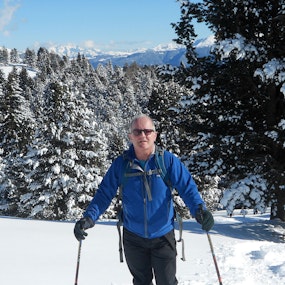
Steve Rout
British Journalist/ Tour Guide/ Online Marketer/ World Traveler
Steve Rout is a British journalist, ski bum, tour guide, online marketer, and world traveler. Steve’s long-term travel adventure began in 1982 when he put his successful journalism career on hold to travel the world. After years of traveling to different continents to ski, rock climb, and paraglide, he found himself back in a corporate office, which led to burnout and a mid-life crisis. So, he quit his job, taught himself web design, and has been working for himself from home for the past 19 years, making money online with SEO, marketing, and working as a tour guide in the mountains of Austria. Now 62 years old, Steve continues living life to the fullest and learning new skills every year.


























